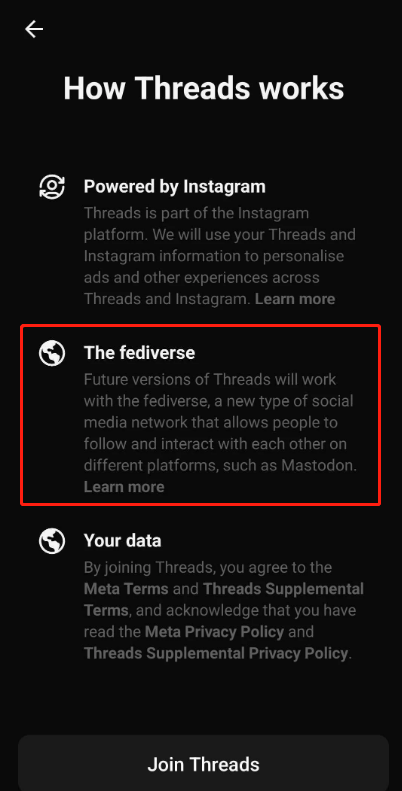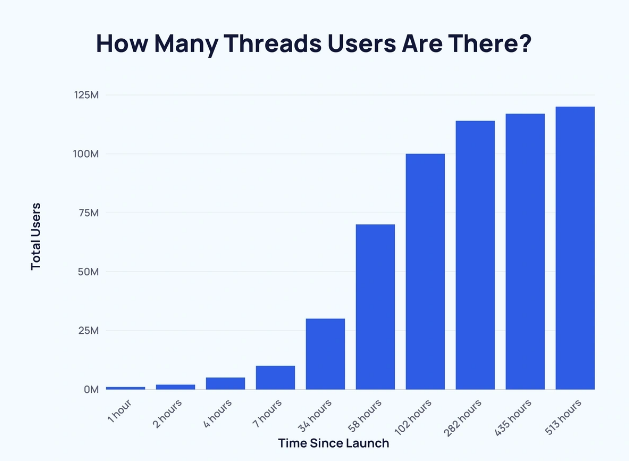In the high-profile beef between Elon Musk and Mark Zuckerberg, Threads, owned by Meta and known as the “Twitter killer,” has emerged. Within 7 hours of its launch, Threads had 10 million registered users, and within 5 days, it had over 100 million users. As of now, the total number of users has reached 120 million.
In addition to the attention garnered by its overt competition with Twitter, some of the claimed features of Threads seem to have piqued the interest of the crypto community.
Meta emphasizes that Threads is “decentralized” and is compatible with the open social network protocol ActivityPub, allowing it to interact with decentralized social platforms such as Mastodon that also support this protocol.
This means that Meta will to some extent reduce its control over Threads user data, giving Threads users more autonomy in operations and data management compared to Instagram and Facebook.
- Sun Circus launches virtual metaverse experience on Roblox for the first time.
- The British Museum plans to turn cultural relics into digital collections and announces a partnership with the Metaverse platform.
- Buying the dip in a bear market is a meme, and it is truly a bad move.
In reality, social media users have long suffered from the “monopoly of information and data” by Web2 social media giants, but there has yet to be a transformative alternative.
Although Zuckerberg has repeatedly emphasized data sovereignty and openness, and even intends to achieve this vision through his metaverse plan, Meta’s inherent centralization is in conflict with the concept of decentralization, and whether its metaverse can truly bring “openness” and “autonomy” to users has always been questioned.
Interestingly, despite Meta’s metaverse plan facing huge losses, it remains Meta’s ultimate goal.
Therefore, when a brand new product like Threads, which also emphasizes data openness, appears, it is hard not to speculate whether Threads has a closer connection to Meta’s metaverse than imagined.
Social Product + Open Social Network Protocol
In fact, in early March, Meta had already signaled to the outside world that it was exploring an “independent decentralized social network” for sharing social content. This happened just as Meta was closing its NFT business.
As a social product directly targeting Twitter, Threads attracted over 100 million registered users in less than a week, causing a craze for joining Threads in both Web2 and Web3.
One of the key points of launching Threads is to realize the concept of a federated universe through the open social network protocol ActivityPub.

The federated universe is a concept that will be introduced in the next version of Threads. It is a network composed of distributed applications and platforms that use a common protocol for interconnection.
Meta claims that future versions of Threads will be compatible with ActivityPub, a protocol established by the World Wide Web Consortium (W3C) and also a protocol in the federated universe.
In other words, if Threads integrates ActivityPub, Threads users will not only be able to communicate and interact within the Threads platform, but also interact with users of different programs and platforms that support this protocol, and vice versa.
There are currently multiple platforms based on ActivityPub, such as Mastodon, PeerTube, and Pixelfed.
Each platform is like a different federation state. Although they have their own unique characteristics and rules, they can share content, information, and users through the ActivityPub protocol, forming a federated universe.
Some ActivityPub-based applications:
– Mastodon: An open-source microblogging platform similar to Twitter.
– PeerTube: An open-source video sharing platform similar to YouTube.
– Pixelfed: An open-source image sharing platform similar to Instagram.
– Funkwhale: An open-source music sharing platform similar to Spotify.
– WriteFreely: An open-source blogging platform similar to Medium.
– Plume: An open-source blogging platform similar to Write.as.
– Pleroma: An open-source microblogging platform similar to Mastodon.
Compared with other social applications under Meta, Threads emphasizes “decentralization” and “openness,” which aligns with Mark Zuckerberg’s vision of an open future world.
Of course, Threads is not Meta’s only product that pursues openness and decentralization.
Meta’s failed attempt at the metaverse
Before Threads, Meta had actually made a series of attempts at decentralization, but the process was not smooth sailing.
Prequel to the metaverse: Libra stablecoin project
In 2019, Meta launched the Libra stablecoin project with the vision of “crossing borders and currency systems to allow everyone to participate in the financial world.” However, since its launch, the project has faced numerous obstacles from regulators and ultimately ended in failure after more than two difficult years.
Although the outcome was painful, the Libra project can be seen as Mark Zuckerberg’s initial exploration and practice of decentralization and digital future, laying the groundwork for Meta’s metaverse plan.
New strategic direction: Focusing on the metaverse
2021 is the year of the NFT and the metaverse explosion. At this time, the Libra project was on the verge of collapse, and Mark Zuckerberg set his sights on the metaverse.
The open concept of the metaverse seems to perfectly align with Mark Zuckerberg’s vision of a decentralized world. This time, Mark Zuckerberg was more direct and bold, renaming the parent company Facebook to Meta to reflect the entire company’s new strategic direction.
The ambition is huge, but it cannot resist the harsh reality. Meta’s metaverse faces two major challenges:
On one hand, there is a consensus conflict: The core idea of a decentralized and open metaverse conflicts with Meta’s image as a centralized and monopolistic entity in the Web2 era, which has become Meta’s “original sin”.
On the other hand, there is continued loss: Reality Labs, as Meta’s core division for the metaverse business, has been continuously invested in by Meta but has been in a state of loss. According to the latest data, Reality Labs has accumulated a total loss of over $21 billion.
Advanced Episode: A Brief Exploration of NFTs
Meta also briefly explored the NFT business by integrating NFT-related features on Facebook and Instagram. As an important component of the development of the metaverse, this move by Meta is also seen as an important step in its metaverse plan.
However, in March of this year, Meta announced that it would gradually stop its NFT business and “focus on supporting creators, individuals, and businesses in other ways.” The NFT experiment came to an end.
Threads – Rational and Smart Attempts in Meta’s Metaverse Progress
According to the latest financial report from Meta, the Reality Labs division of the metaverse incurred a loss of $3.74 billion in Q2, but Zuckerberg stated that they are still “fully committed to the metaverse vision.”
Obviously, Zuckerberg’s vision and ambition for the decentralized world did not stop here.
Threads is another demonstration of his ambition, and perhaps the smartest attempt by Meta in decentralization and the metaverse so far.
Looking at Meta’s previous attempts, there is a prominent feature – being very direct. The actions are grand, but they give a sense of “forcefulness.”
More often, they rigidly integrate with existing businesses, wanting to directly sell their own things, without considering the differences in audience, community, and business models.
Perhaps after experiencing a series of failed attempts, Meta has realized that cryptocurrency users are not necessarily their metaverse users, but their metaverse users definitely come from social products.
The failure of integrating the NFT business also suggests to some extent that exploring decentralization on the basis of existing products is not feasible. The smartest approach is to start anew, create a new social product, and explore decentralization from there.
From this perspective, Threads based on ActivityPub is likely to become the most effective and smartest way for Meta in its metaverse plan, and also a compromise in its overall metaverse strategy.
Users who have been attracted to the “decentralized” and “open” concepts from the beginning, if Threads succeeds, these users may ultimately become users in Meta’s metaverse.
Meta’s metaverse focuses on an open and interconnected virtual world. Whether Threads, which is part of the federated universe, can eventually become a component of Meta’s metaverse is full of imagination.
Can it succeed?
Some believe that Meta’s adoption of ActivityPub and the federated universe is of great significance for the recognition and adoption of such decentralized social network protocols and related decentralized applications by the public.
Recently, BBC announced its participation in using Mastodon, to try and experiment with decentralized and distributed social technologies.
(BBC Mastodon interface)
There are also voices that believe that Meta is ultimately a profit-oriented company. To what extent can the decentralization of Threads be achieved? Will Threads integrate other decentralized social protocols in the future? This requires long-term observation.
Threads does have a good start, but from the current data, there are clear signs of a slowdown in user growth. It remains to be seen whether joining the metaverse will bring about another explosive growth in users.

(Source: https://explodingtopics.com/blog/threads-users)
In addition to Meta’s big moves, Twitter, as a competitor of Threads, has recently undergone a brand reshaping. Led by Elon Musk, who favors encryption, Twitter is likely to incorporate more cryptographic elements and features. The Web2 social media giant is expected to engage in a new round of fierce competition in the decentralized direction.
Like what you're reading? Subscribe to our top stories.
We will continue to update Gambling Chain; if you have any questions or suggestions, please contact us!